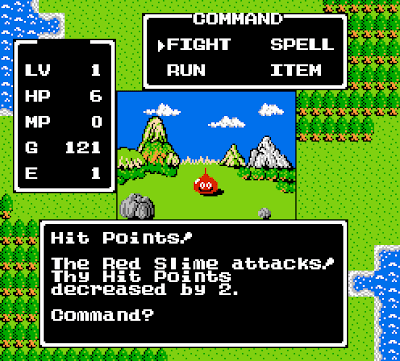I love video games. On all platforms, in most genres, through all generations. Sometimes, however, video games can be annoying. As my gaming tastes have matured, I find my tolerance for certain aspects of certain games waning fast. One such example is the age-old RANDOM ENCOUNTER, dating back to the infancy of role-playing games.
The random encounter (or random battle) is an instance in a traditional RPG where the exploratory action on the “overworld” or “dungeon” map is disrupted without notice, sending the player into a fight, usually viewed from a vastly different perspective. The combat is resolved, after which experience points are awarded, money and items are collected, and the adventure resumes from where it left off.
 The reasoning behind the inclusion of random battles is to simulate the experience of travel through hostile environments. There is always a chance of ambush, and characters within the story would likely feel at least slightly uneasy as they progress, compelling them to always be on guard. With the implementation of the random encounter, this feeling is transferred to the gamer himself, who then anticipates a fight at every turn. This leads him to keep the party well equipped and in good health at all times – to be prepared.
The reasoning behind the inclusion of random battles is to simulate the experience of travel through hostile environments. There is always a chance of ambush, and characters within the story would likely feel at least slightly uneasy as they progress, compelling them to always be on guard. With the implementation of the random encounter, this feeling is transferred to the gamer himself, who then anticipates a fight at every turn. This leads him to keep the party well equipped and in good health at all times – to be prepared.
Unfortunately, traditional RPGs can be entirely too representational to keep players immersed in such a way. We don’t necessarily picture the game’s characters wandering through the woods or creeping through cavernous tunnels, so much as we see a sprite or 3D model glide over a background on the screen. It’s not as easy a translation as, “Holy s***! F***! Another fight!”
 Frustration is a nearly unavoidable part of gaming, and it rears its ugly head and strikes HARD after hours of random encounters. The only purpose random battles serve at that point is to break up the story, and the general flow of the game as a whole. They are no longer fun. Some games are so loaded with these time-filling segments that players find themselves taking only a few steps between fights. Couple that annoyance with a difficult set of enemies, and you have an algorithm for “turn off console.” Even an otherwise excellent title, with a good plot and solid gameplay can fall victim to this untimely fate – especially after repeated “game over” screens or copious amounts of lost progress.
Frustration is a nearly unavoidable part of gaming, and it rears its ugly head and strikes HARD after hours of random encounters. The only purpose random battles serve at that point is to break up the story, and the general flow of the game as a whole. They are no longer fun. Some games are so loaded with these time-filling segments that players find themselves taking only a few steps between fights. Couple that annoyance with a difficult set of enemies, and you have an algorithm for “turn off console.” Even an otherwise excellent title, with a good plot and solid gameplay can fall victim to this untimely fate – especially after repeated “game over” screens or copious amounts of lost progress.
Notorious for random encounters are the traditional Japanese-style RPGs, such as the Dragon Warrior series. In fact, the original Dragon Warrior for the NES subjected players to a fight EVERY TWO STEPS at a certain point in the game. After dying, they were transported to the very first town, and had to set out once again.
Solutions are out there, however, and some modern RPGs have adopted them, to the applause of gamers and critics around the world. One simple fix, while still following the dual-perspective approach, is to display all enemies (or at least representative icons) on the overworld map. This way, gamers can choose to either confront or avoid their opponents as they see fit. Contact with an enemy in the overworld still leads to a separate battle screen, but at least the player isn’t caught completely off guard or bogged down by incessant fighting.

The Earthbound (pictured above) and Paper Mario series are good examples of this type of encounter system. Then there are Japanese RPGs like Chrono Trigger and western RPGs such as Star Wars: KOTOR and Elder Scrolls IV: Oblivion that take the idea a few steps further. As before, enemies are present at all times on the overworld screen, but in these games, the overworld and battle perspectives are one and the same. Oblivion even goes so far as to make battles real-time – with no disruption whatsoever.
This is just as it should be – the games we play should flow like water, delivering a seamless, wholly enjoyable experience. Design flaws should never be the source of a gamer’s frustration – only the content of the game should be able to affect our emotional state while immersed in the virtual world.

















